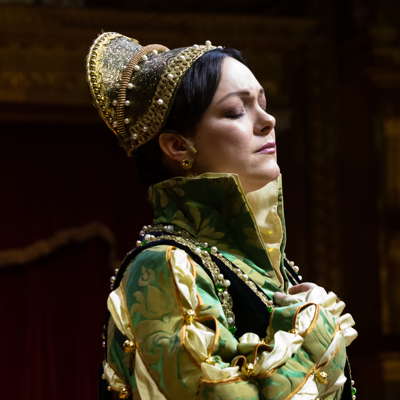 UPDATES: There's a new feature every day at Classical Music Daily. Read about the various ways we can keep in touch with you about what's happening here.
UPDATES: There's a new feature every day at Classical Music Daily. Read about the various ways we can keep in touch with you about what's happening here.
Noteworthy and Sometimes Momentous
RODERIC DUNNETT visits the UK's Garsington Opera for Britten's 'The Turn of the Screw'
Since 2011, when following the untimely death in 2005 of the Festival's founder and initial inspiration, Leonard Ingrams - the banker youngest brother of Richard Ingrams of Private Eye and The Oldie fame - and after a brief transition, Garsington Opera was obliged to shift location from Ingrams' Jacobean manor to a new venue, Mark Getty's spacious and elegant estate at Wormsley, just across the Buckinghamshire border.
Garsington at Wormsley, now presided over by administrator Nicola Creed (Executive Director) and artistic director Douglas Boyd, was chosen from over a dozen possible venues, and with its still brand new-feeling auditorium it has proved a triumphant success. Ingrams' wife, Rosalind, has succeeded as the event's president, so the link – and the excellent idea of retaining the Ingrams' Garsington name - is one touching aspect.
This year's programme featured a highly praised staging of Monteverdi's early opera Orfeo; Dvořák's best known and extraordinarily beautiful creation Rusalka, his second last opera (conducted at Wormsley this year by Boyd) – although much else of Dvořák remains to be discovered: ten operas, such as Vanda and Jakobín; and here, Benjamin Britten's masterpiece The Turn of the Screw, expertly conducted and nursed by Mark Wigglesworth.
One generally unmentioned factor that guaranteed Garsington's The Turn of the Screw prove especially captivating is that, thanks to their use of surtitles, you could be sure – from any part of the magnificent (indeed exciting) pavilion auditorium - to follow the English text. This standpoint, or the first whispers of it - caused quite a ruction a few years ago, when some commentators and critics dubbed it as stupid; virtually an outrage.
But that is to make the mistake of thinking English – one of the most difficult languages to enunciate clearly in opera – will be heard and comprehended anyway, with no need of such aids. Given that most attenders at summer opera venues are in their sixties to eighties, this seems, well, optimistic.
Myfanwy Piper's miraculously crafted libretto – the same goes for her adaptation later of Thomas Mann's autobiographical Death in Venice - is so startlingly inventive, so poetic, such a key part of the whole opera, that not a word or phrase should be missed. Even the housekeeper, Mrs Grose - the splendid Susan Bickley, admirably sympathetic - has her moments: 'Cradles for cats Are string and air ...'. Her description of the mysterious, but to her well remembered, Quint's death, is horrific, the music equally so. Unlike the Governess she knows the two supposedly malicious characters are both dead. But she has worldly wisdom too: 'A boy is no boy for me unless he be a little wild.'
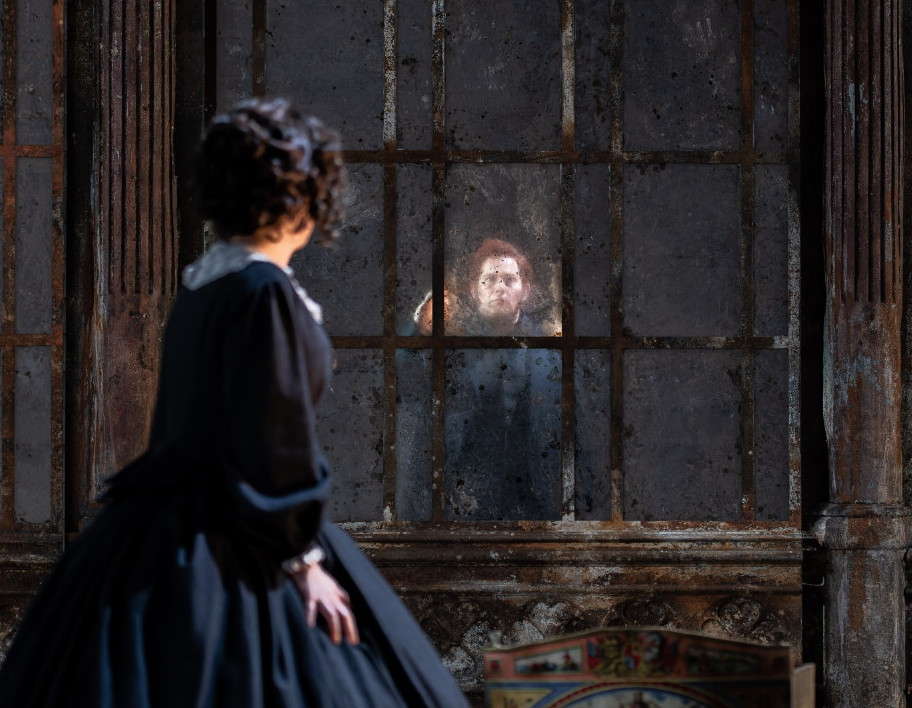
The Governess's first close encounter with the (to her) horrifying ghost of Peter Quint in Garsington Opera's chilling The Turn of the Screw. Photo © 2022 Julian Guidera
A term often used about The Turn of the Screw is 'chilling'. Coincidentally and ironically, Peter Quint has died, Grose relates, while slipping on ice. Quint's entire words alone, in several scenes (and to some extent Flora's), are at the heart of the poetry. 'The riderless horse Snorting and stamping ...' 'Slick as a juggler's mate.' 'I am the hidden light that stirs When the candle is out.' 'The long sighing flight of the night-winged bird;' 'then to his bright subservience I'll expound the desperate passions of a haunted heart.' Subservience? Passions? Haunted?
The orphaned ten year old boy Miles's words are unvarnished: evasive, daring, challenging, yet honest, polished, and all the more deeply disturbing. No wonder Miles – intriguingly sung at the premiere by David Hemmings, who continued his friendship with Britten for many years - is obsessed: and still dedicated to his supposed abuser (or whatever Susan Bickley's 'He – Quint - made free with her, Miss Jessel – too' implies). Line after line amplifies and heightens what the newly imported Governess fears.
Miles, the boy himself points out, is growing up, and wants to be 'with his kind'. He is also, conceivably, on the edge of sexual awareness. Intrigued, like the rest of 'his kind'. He does not wish to be 'dear little Miles': 'a pet, an angel, an innocent babe'. A more common view is that the Governess – who has no name, in opera or novella - is the one with sexual repression and embitterment, because of her unattainable passion for the children's uncle (her absent employer).
Miles has been expelled, presumably from Prep School. What on earth for? Did he steal something, like the Governess's letter? 'Miles, what happened at school? And here?' she asks. But Miles turns away and avoids her. And her endless questioning. We are left with an additional puzzle. 'Does my uncle think what you think? ... What a lot you'll have to tell him.' 'I'm always thinking, thinking ... of this queer life we've been living.' From the late nineteenth century, certainly by 1898 when Henry James wrote his novella, 'queer', as well as odd, meant homosexual. A strange term, not least in Britten-Piper. And 'You see, I am bad, I am bad, aren't I?' Miles's vitally significant utterance that closes Act I. He is, in Latin terms, 'malus'.
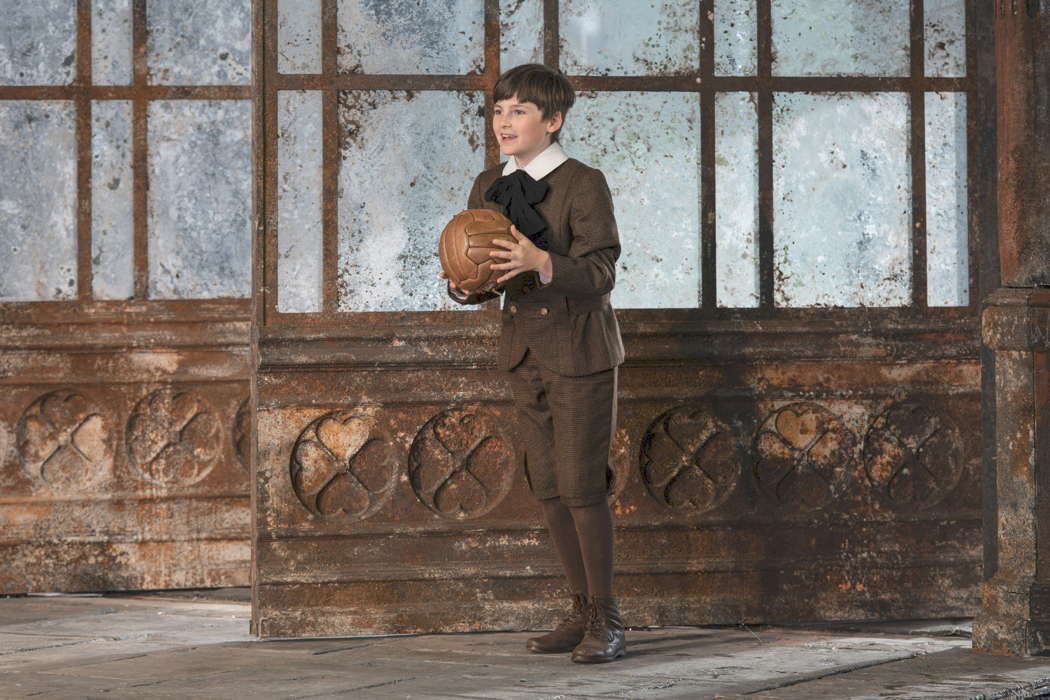
Everything looks fine - or is it? Ben Fletcher as a superbly sung and acted Miles on Garsington Opera's revival of The Turn of the Screw. Photo © 2022 Julian Guidera
What really matters is the unerring perfection of Ben Fletcher's singing: his intonation, projection, delivery. All fabulous.
Miles, with his linguistic finesse, has plenty to expound: the hysterical, or quizzical, outwardly weird Latin mnemonic (Clunis, crinis, fascis, follis ...). Clunis actually means 'buttock', or 'arsehole' as The Guardian once charmingly put it; and caulis = the membrum virile, ie penis; two others as well, including vermis 'worm' imply prick, or to Miles, 'willy'; particularly a small or undeveloped one; another word, (follis, bag) = 'scrotum'. And for good measure, canalis has as its subsidiary meaning 'sewer', mensis (month) = 'period', and unguis, in its indecent sense, 'a middle finger stuck up at somebody'.
Kennedy's Latin Primer, borrowed by Britten, and passed by him to Myfanwy Piper (who probably knew the axioms), revelled – semi-secretly – in these ambiguities. Most are in Lewis and Short, the commonly used Latin dictionary. Unlikely Miles, surely a budding scholar, didn't look these up. His harping on them feels more than a tease, although that may be just what it is. Perhaps, missing a trick, he just doesn't know.
It could be said that Ben Fletcher (alternating the role with Isaac Rogers) is the best actor of the lot. Fabulously directed by Louisa Muller (herself almost the title of a Verdi opera), Master Fletcher seems to have it all. Every flicker of movement, gesture, his head, neck, squeezed shoulders, legs, walk (just one leg sometimes, intentionally, dragged behind), knees periodically tightly together – even this he manages ominously; clasped hands; the way he turns like Visconti's Tadzio. Ben's Miles, not quite teenage, 'little' in aspect - supposedly aged ten - but quite the opposite in articulacy, has a reason for every utterance - as interpreted by the newly arrived, ears waggling young Governess: a purpose, daring, electricity; seriousness, sensitivity, genuineness; perhaps especially a challenge. He's so zippy, you might think him a scatterbrain, or on Ecstasy.
Two details added to the children's play. Once when they emerge (playfully? mockingly?) in white masks, although they immediately discard them, which rather diminishes the point, whatever the point was. Just another joke, but a curious, almost threatening one. And once when they regally appear, wonderfully attired, as a king and queen - mimicking Myfanwy Piper's nursery rhyme Lavender's Blue. These two could display dignity when they want to. This was a rather magical moment.
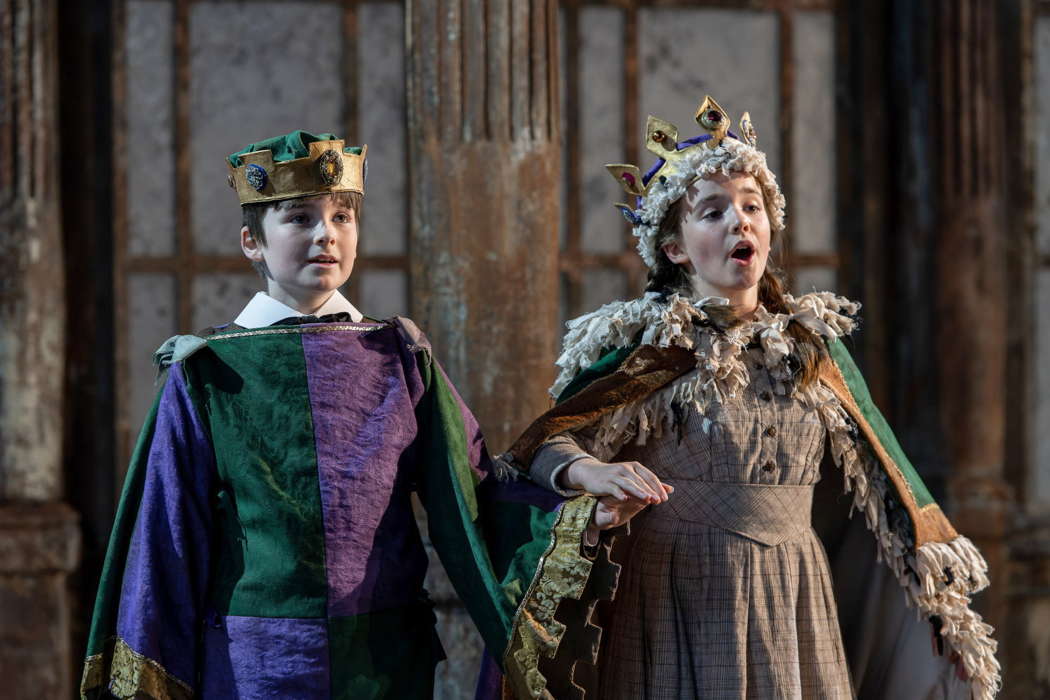
'When I am King, you shall be Queen'. Ben Fletcher as Miles and Maia Greaves as Flora dress up as royalty in Garsington's The Turn of the Screw. Photo © 2022 Julian Guidera
Some of Miles's vitality, this sheer quality of his acting, must, may, have been devised by this exquisite, fledging adolescent himself, once he delved into the role. He has got the Director's message, taken all her instructions and suggestions to heart, assimilated the character, taken the boy's complex personality completely on board: the impudent, the playful, the defiant, the provocative, and by stages, the confrontational. Intellectually, Ben's Miles is not 'little' at all.
In the original 1950s staging, the tradition of girl singers we have now at so many cathedrals – plus the colleges at Oxford and Cambridge, and a host of choral youth outreach schemes such as Garsington values so highly (under its head of music, Jonathon Cole-Swinard) – simply did not exist. As in the 15th century to the 1990s, cathedral choirs figured boys only. Hence rather unadventurously Britten cast a small but not (as has been claimed) uncomely singer called Olive Dwyer, aged forty-five, as Flora in the 1954 Venice and Sadlers Wells premieres. Happily things have changed, and here at Garsington young Maia Greaves seemed a perfect, ideal casting.
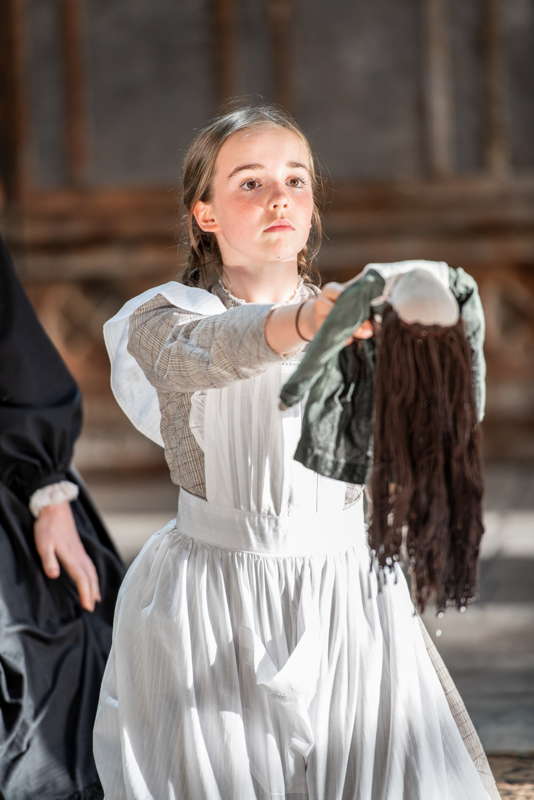
Her once beloved dolly is quite clearly doomed - Maia Greaves as a sensationally self-willed Flora in Garsington Opera's staging of The Turn of the Screw. Photo © 2022 Julian Guidera
Not least because she too was well directed, and succeeded in generating a very believable - and equally naughty and self-willed – what is normally assumed to be a younger sister. Is she bad too, like Miles? She certainly makes us think so, not just by the lake but when she disappears, to the chagrin and disquiet, indeed foreboding, of the (unnamed) Governess and Mrs Grose. Has she gone to ally herself with her teacher, playmate, or ensnarer, Miss Jessel? And what are they, or were they, up to?
Even Flora's dead tutor - the forceful and formidable Helena Dix - has, albeit not many, periodic moments of unforeseen imagery. In the 'Colloquy' scene, the idea Myfanwy poached from Verlaine, for instance; or her weird 'Beauty forsaken in the beast's demesne, The little mermaid weeping on the sill.' What on earth is she on about? Yet she, like Quint, seems to speak a language the children understand.
So – a fantastically acted Miles and Flora, the girl inspired, the boy staggering; a sparkling text; a finely sung and acted housekeeper. What of Garsington's Governess, on whom everything hinges?
Verity Wingate must have been a very sweet and touching Pamina in Garsington's Magic Flute - 2011 and 2018, presumably the latter. In this Turn of the Screw, virtually from the outset, her angst at dealing with her recalcitrant charges was intense and perturbed. We see her go through a gamut of moods, from charmed, protective and optimistic to puzzled and concerned, to desperate and distressed, to horrified. She loses the children; she loses us.
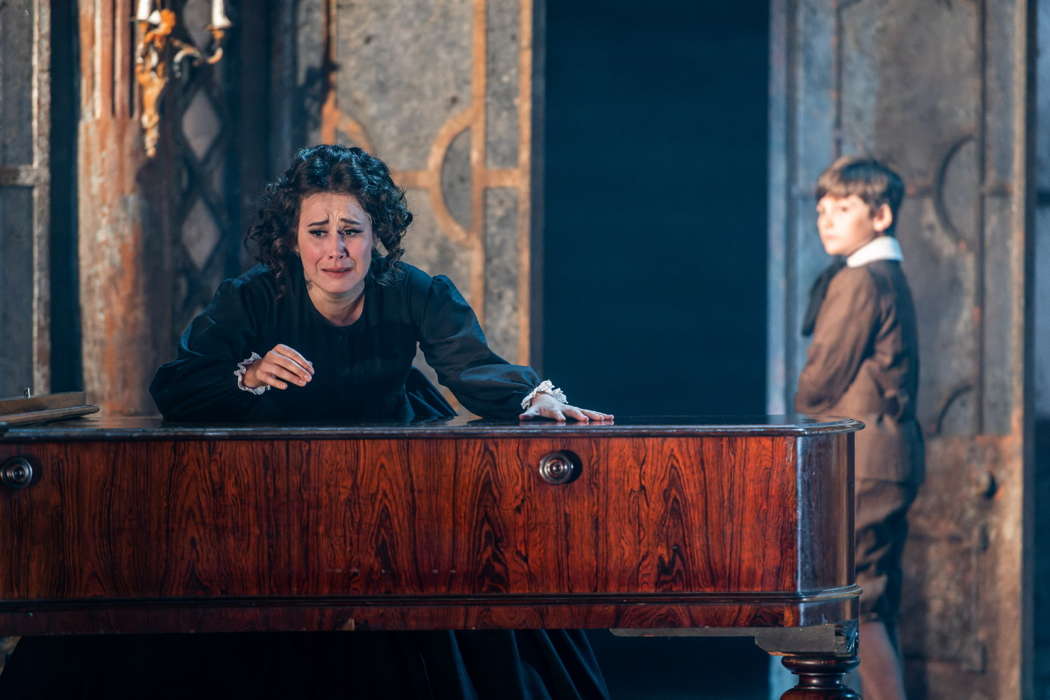
The grand piano brings little comfort. Verity Wingate as the escalatingly obsessive Governess and Miles (Ben Fletcher) in The Turn of the Screw. Photo © 2022 Julian Guidera
Verity, like Ben, holds our attention at every point. We are meant to empathise with her, and take her side; only latterly do we conclude, perhaps, that she is deranged, obsessive, a negative influence. Does Miles die because of (forced by her) renouncing Quint; or does he die because of her, and her cramping denial of his growing up? It's one of the story's many quandaries: enigmatic; baffling; but not necessarily malign.
Wingate is certainly one of the most arresting (and most athletic) Governesses I can remember. This is partly because of her range of impulsive fretfulness. She expresses her desperation in different ways. One of the fresh, pretty much original touches of Wingate's interpretation, or rather Louisa Muller's ingenious handling of her, is that – before the ghastly nightmare begins – Muller has her joyfully join in the children's games, instead of just watching: Miles's hoop; the ditty 'Tom, Tom the Piper's Son' (bizarre double coincidence, as John Piper designed the original set); Flora's pram (and the dolly she drowns in the lake) cause the Governess, already getting queasy, to collapse on the floor overwhelmed, in a kind of flattened trance; and troublingly, shockingly, abysmally in terms of the impending outcome, a toy sword fight in which she – an irony, and a forestalling - 'kills' Miles and weeps over him. Brilliant.
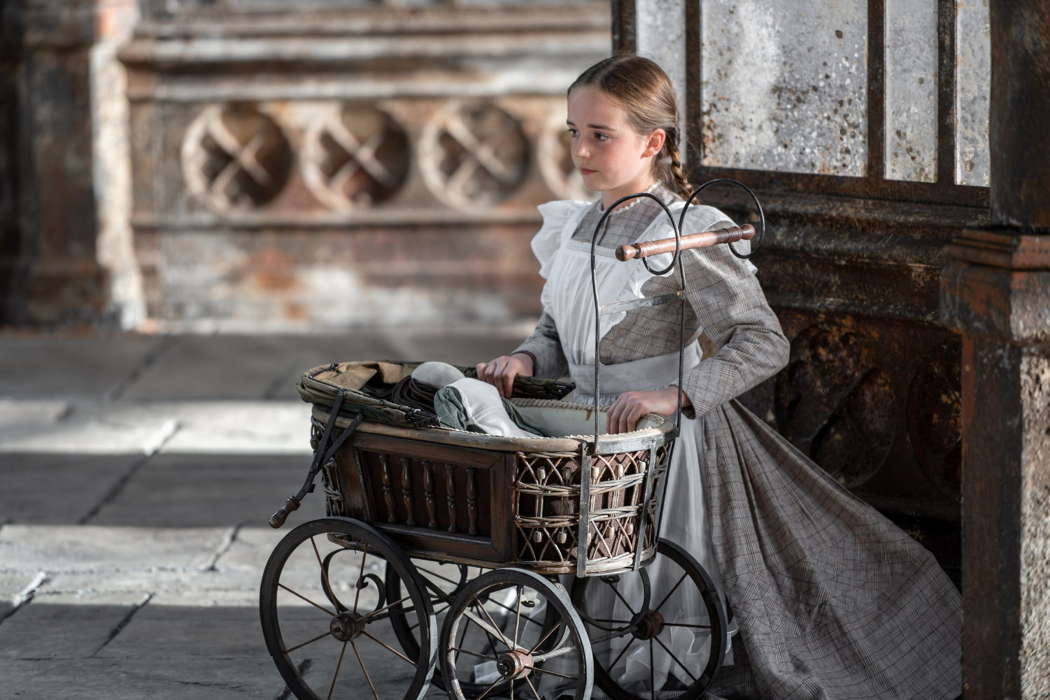
The pram - a classic instance of designer Malcolm Rippeth's brilliantly researched props. Flora (Maia Greaves) tends to her doll. Photo © 2022 Julian Guidera
This strikingly realistic Governess-children interaction must have occurred in productions elsewhere; but in some ten other Screws before Muller's I can't recall it being invoked. Shared enjoyment. Fun – apparently. One of this absorbing, rightly Miles-focused production's cleverest details.
Christopher Oram's props, especially in these 'play' sequences, were superlative: each took us right back to the Henry James period: someone must have researched them assiduously. The 'lake', a diminutive puddle placed all but invisibly frontstage left, although later enlarged, not entirely visibly, was not in the same class. Nor were the broken silver-grey blocks which scissored through the stage for Act II. Scarcely used: a bit like a good big idea - shattering, splitting, emotionally splintering - that sort of got forgotten.
And Oram's set as a whole? His magnificently impressive design credits include Glyndebourne - another Britten, Billy Budd -, the Donmar, RNT, RSC. He sticks, she would have applauded, to something Myfanwy Piper insisted on, and got infuriated if it was ignored: that Bly (the manor) should remain as a single set, not altering. All honour to him for that. And his huge Garsington backdrop of a brown, gloomy mansion captures the creepy, scary, oppressive unpleasantness of James's whole invention. You can almost see spiders spinning their obnoxious webs.
But in the libretto, and in effect in the score, while admittedly Quint looks through a (downstairs?) window, to capture him on a tower (where the Governess affirms she has glimpsed him) - as Pears was in the original (hence authentic) first production - is much more affecting, and all the more ominous for it. Later he turns up on a stairway - see the suggestive full-page image in the Programme book. This present set gradually becomes boring. It's too simplistic. It fails to invent.
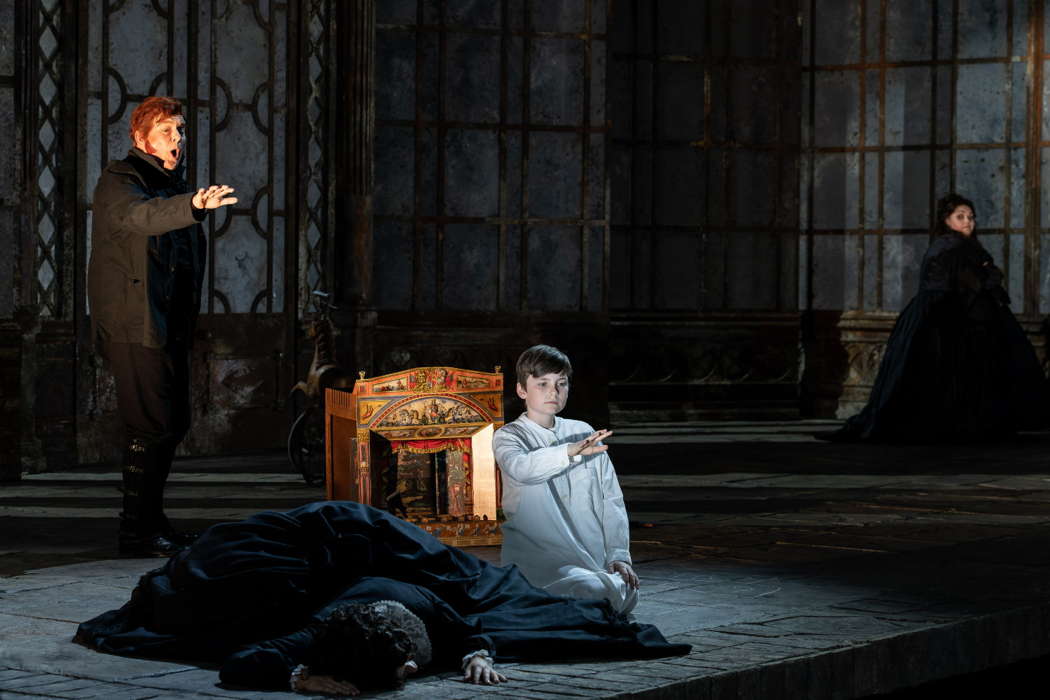
Ben Fletcher as Miles, under threat from Quint. Notice the exceptionally good lighting by Malcolm Rippeth. Photo © 2022 Julian Guidera
Yes, Bly should stay in essence static; yet it also needs to be elaborate, intricate, to a degree varied. This backdrop, a good idea at the start, like dark brown indoor panelling, never suggesting outside, soon failed to be intriguing. Or apt. Even Malcolm Rippeth's more than adequately judged lighting - his spotlight on Miss Jessel's desk, sundry candles, his contriving of an almost orange - ie dated, subdued - luminescence - never quite made the difference.
At one moment towards the end – possibly the (rather good) Letter scene, complete with blotter – Rippeth's imagination threw up a vast shadow image of, apparently, the Governess - too slender to be Jessel. It seemed a startling, and welcome, departure. But such an additional vision needs preparation, or consequence. It was rather like the axed to pieces, slightly Caspar David Friedrich-like Act II floor.
So Quint (and Miss Jessel) remain grounded: a bit bizarrely, as if he doesn't quite know what to do next – certainly not in command. Quint slithers around at floor level. He hovers repeatedly behind the lad, but never touches him (which he must have done often in their games, or indeed mutual discoveries and gallivanting together). In her case, as the children's teacher (hence the desk), Helena Dix's hefty dead spectre is forced to enter repeatedly at frontstage left – neither memorably nor disconcertingly – and her presence, or Flora's devotion to her, never seems realistic. Murray, as Quint, is obliged to enter merely at ground level from behind and round a stage flat. These weedy entrances (and exits) were a duff use of set, and, at worst, a breathtaking lack of invention.
However Robert Murray is a singer one has frequently admired, always with good reason. His Uncle and Guardian at the start was really rather fine: solicitous to a degree, yet meanly abandoning. Despite a fractionally weak presence, his eloquent, melodious, flowing, hugely appealing, refined singing – especially of Myfanwy Piper's most exotic, magical lines - might of itself provide sufficient attraction for Miles.
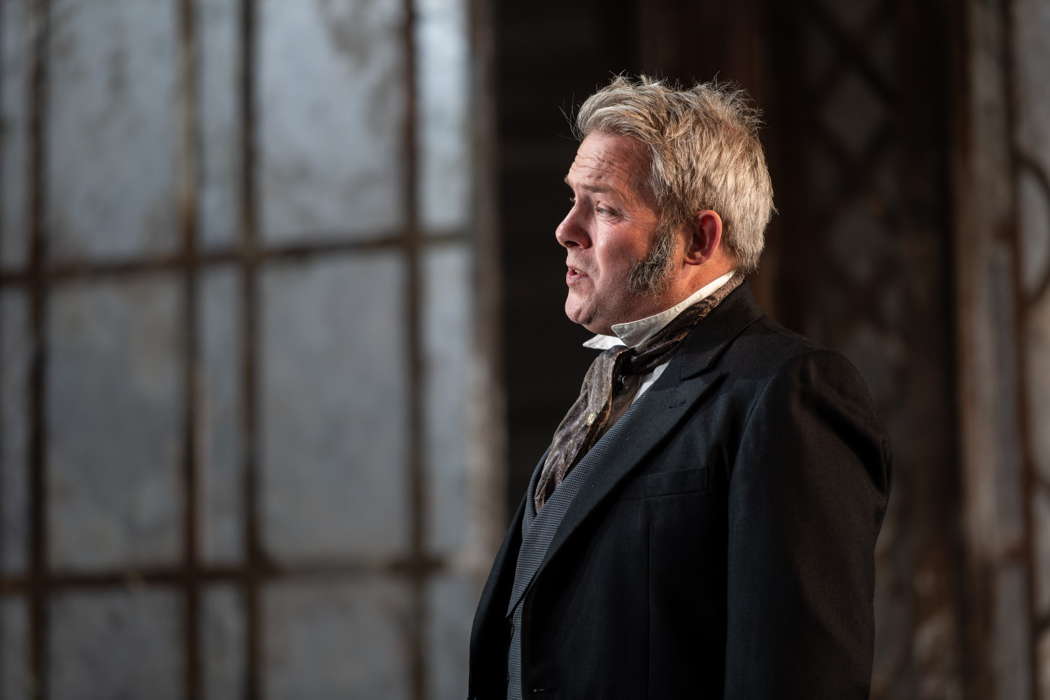
Robert Murray as the children's uncle and guardian in Garsington Opera's revival of Britten's The Turn of the Screw. Photo © 2022 Julian Guidera
But the frissons of danger are few and far between. Rather, it looked like a sort of clumsy dance. Possessive yes, but nothing truly ensnaring, nothing risqué. It's impossible to believe that Ed Lyon, the previous Wormsley Quint - the lead in this season's Orfeo, and who will feature also this summer in Garsington's creative Community Opera - was not more menacing; even more sexual. 'He liked them pretty'. Them must mean more than just Jessel. That's not, or not explicitly, in Henry James. But in the Britten? In Deborah Warner's 1997 version at the Barbican Theatre, Ian Bostridge's unmistakable fondling, canoodling, caressing attraction to Edward Burrowes, intensely tactile, dared put a foot into murky waters. And it all made sense.
Both the ingenuity of the prickly, chameleon-like evolving motif and the scoring Britten deploys in The Turn of the Screw is brilliant and fascinating, from the very first sparse outline of the serrated Bergian note-row - Berg having been one of the first to adapt the twelve-note sequence to square with recognisably normal harmonies, thus making it less disconcerting and more enticing to the unfamiliar listener. Britten, incidentally, was an admirer of Berg. The use of a solo violin - the Philharmonia's exceptional co-leader, Zsolt-Tihamér Visontay, capturing, par excellence, the shock at Miles' expulsion - and more uneasily, Britten's own instrument, the viola (Yukiko Ogura) amid the Miles music, to provide added pangs and poignancy at key moments, was crucial; in Britten it always is. The piano at the start, and the celesta which joins in shortly, both played by Patrick Milne, were indispensable: domineering, urging, whispering, conniving, mystery-making, danger-unfolding.
The harp, when it appears (Heidi Krutzen), tears at the heartstrings; or appends strange hints and murmurs. The horn (Laurence Davies) is the keenest to take out and repolish the jagged opening. Britten is constantly passing the torch from one wind instrument to another - flute to oboe, or vice-versa - perhaps a consequence of this being devised for a single-woodwind chamber ensemble: indeed only the violins are doubled. Sometimes the textures are varied by means of alternatives - alto flute, bass clarinet, etc.
The Philharmonia's bassoon (Emily Hultmark) becomes increasingly important – and intoxicating - as a solo instrument, whispering whether encouragingly or mockingly around Miles, aching, teasing, tantalising, like a warning bird - red kites in the Wormsley valley. Where cello (Karen Stephenson) emerges, it grieves, shivers – or questions: 'Mrs Grose, what has happened in this house?' Much the same goes for double bass (Tim Gibbs). The tympani, all the more dramatic for being used sparely, spoke volumes. One moment when they gave way to a single flute was – like many moments in this Garsington presentation, quite divine.
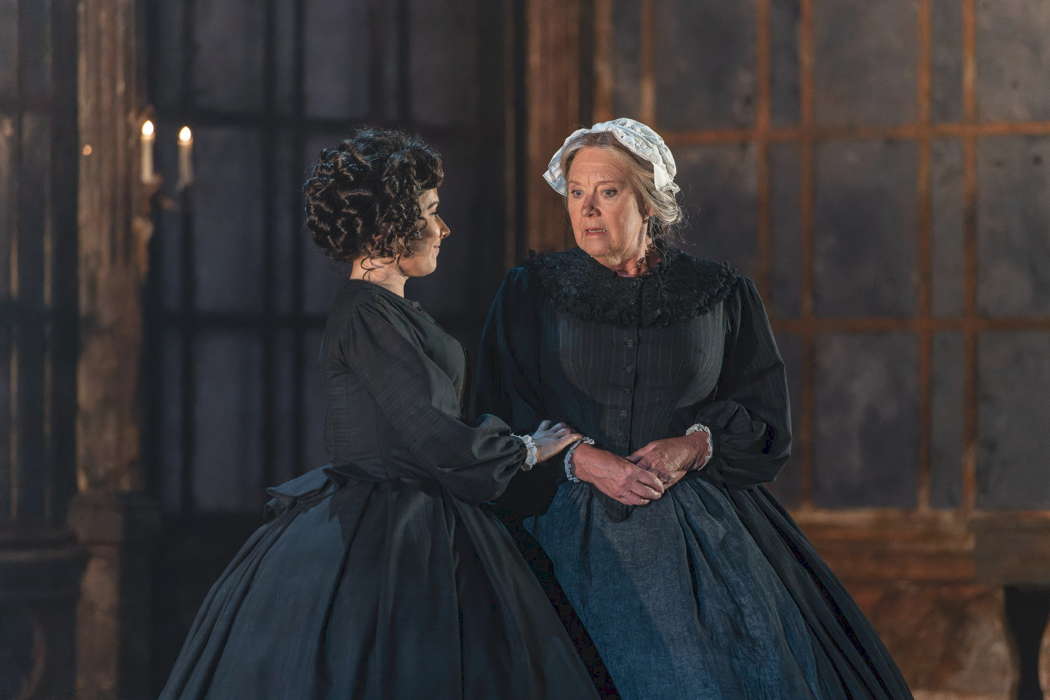
Verity Wingate as the vividly played Governess consults with the increasingly sceptical housekeeper Mrs Grose - the splendid Susan Bickley. Photo © 2022 Julian Guidera
In this most compact of operas, to have such chamber soloists from a top orchestra - conveniently en route to a similar residency at the Three Choirs Festival - lifts the musical undertow to a whole new level. Just the tone quality of these players, the carefully rehearsed plangency of all the strings, the highly subtle balance of the ensemble under Mark Wigglesworth's scrupulous and percipient leadership - the pacings are generally known, but were enrichingly adhered to here; and some of the stillnesses, as well as many marvellous, enraptured and telling interludes, shone out. Finally the entire band's fadeaway as Quint exits (and Miles, still unbeknown to us, dies) was quite phenomenal, giving Garsington's Turn of the Screw an all but incredible, unusually affecting ending.
Wingate's Governess really has no idea at all of what to make of Quint. And is not meant to. Initially, understandably, she is taken by surprise: 'Some curious madman, adventurer, intruder'. But soon she intrudes her own prejudice: 'That man, impudent, spoiled, depraved.' How does she know all this? Where does she conjure it from? And the real danger to Miles starts here. The house is 'poisoned'; 'The children are with them, not with us.' And rather more surprisingly, 'The children are mad, or I am.'
She contemplates flight, 'away from those false little lovely eyes'. But as dangerous as anything, is her 'You shall be mine, and I will save you.' That 'mine' is exactly what Helena Dix's overpowering Miss Jessel says in the Schoolroom scene ('They are mine, the children are mine'); and Quint before the end ('Miles, you are mine'). The distraught Governess has set herself up in direct opposition to these 'foggy walls of evil' which 'press upon me'. She has become a warrior. And a disastrous one.
Another touch of ingenuity in the libretto, and music, fabulously underlined by the two young performers here, here, is the repetitions. 'Now chase me, chase me!' 'I'll catch you! I'll catch you!' is part of their genuine, presumably inncent play. In the crucial night scene, Miles and Flora appear in the purest of white nightwear, the Governess too – quite normal for each.
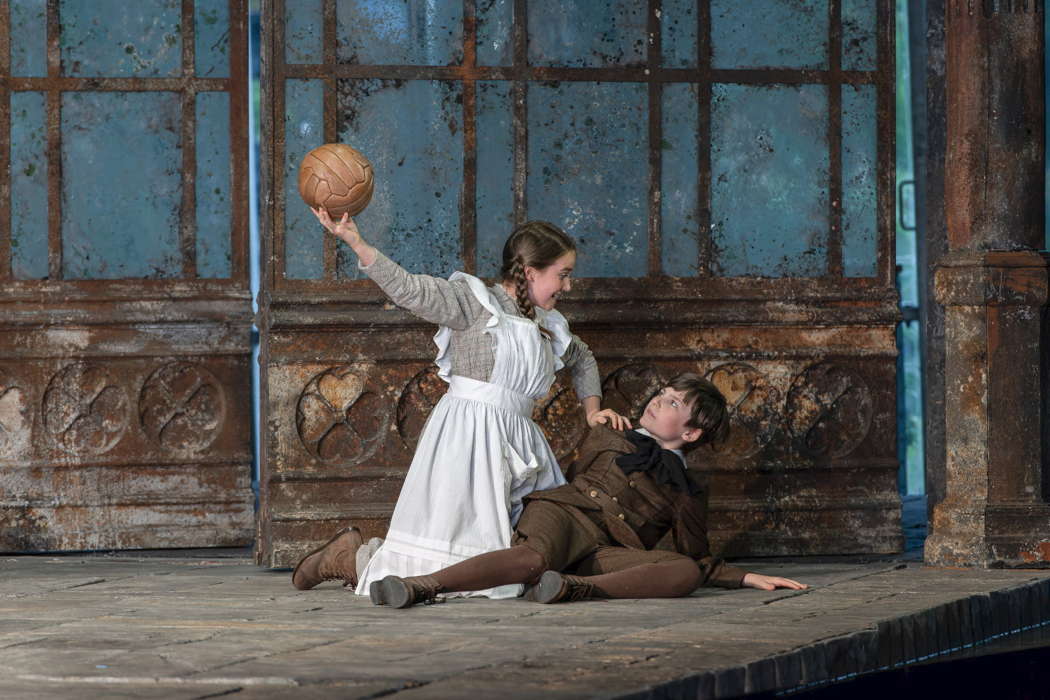
All in play - Maia Greaves as the hyperactive Flora and Ben Fletcher as her troubled brother Miles. Both excite the fatal suspicion of their new Governess. Photo © 2022 Julian Guidera
But in the bewitched boy's direct contact with his guiding spectre, Miles echoes Quint's poetry: 'Gold, O yes, gold!'; significantly, 'Secrets!' And 'bird'. In the same way, when Miles declaims his rhyming Latin vocabulary, Flora imitates: 'collis, follis, cumis, glis ...' and adds her own coinage, nis, ris, tis. Flora's echoing is seemingly just in play. But Miles's? The words of a (submissive) acolyte?
Ben Fletcher and Maia Greaves, and doubtless the other pair, had been coached to squeeze every ounce of importance and suggestion from these ditties, as indeed they with such instinct and insight contrived in the whole of their anxiety-inducing activities. If Garsington's other pair - Isaac Hughes as Miles and Adrianna Forbes-Dorant as Flora - were as good as these two, they will have been superb. Flora's (Greaves's) snarl at the Governess as Mrs Grose prepares to take her away - 'You're cruel, horrid, hateful, nasty ... Take me away! I hate her!' - was little short of sensational.
Mileses differ, but as conductor Jane Glover once said, 'Have you ever seen a bad Miles?' One of the most different was a young Andrew Kennedy - fabulous voice already, of course - then Head Chorister at Durham Cathedral, who bounced around the stage like a rubber ball. But perhaps the most telling was Jonathan Darbourne, now a countertenor soloist and conductor, who appeared at the then newly reopened Wilton's Music Hall. The really mesmerising thing about Darbourne's Miles is that you had the feeling that, albeit patently aristocratic, he has already supplanted Quint. And his own father. In charge. That the manservant had trained him up, on horseback, in stables, on lawn, on river, to be the Lord of the Manor. That Miles has willingly, and gladly, acquiesced in it all. That the real 'challenge' came from her presumption, not the other way round.
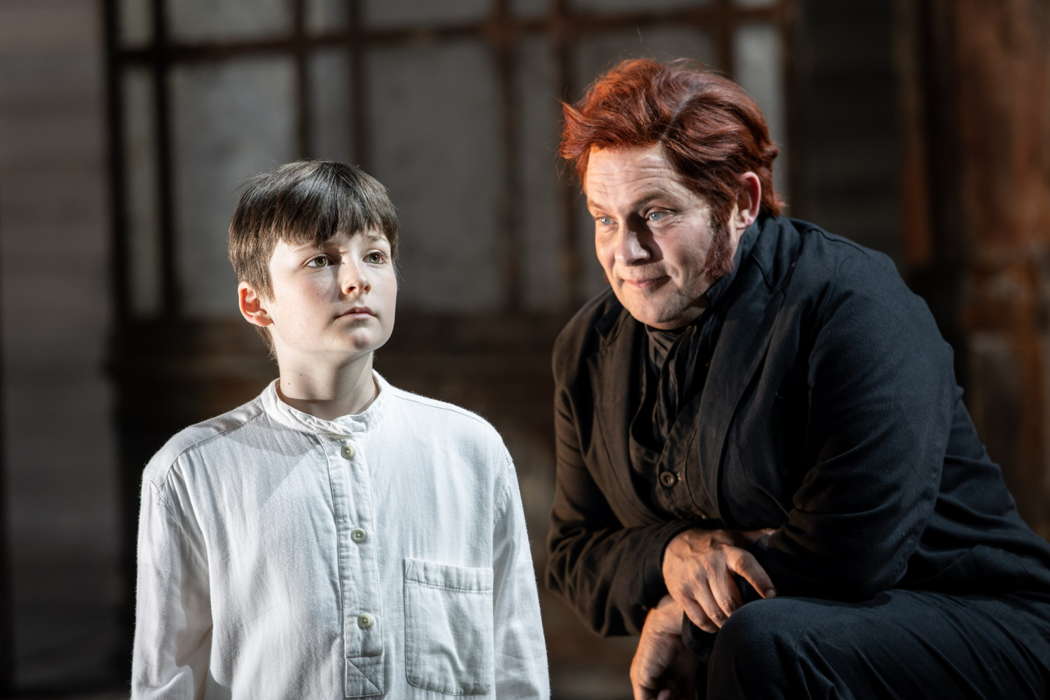
Ben Fletcher as Miles, in Garsington's The Turn of the Screw. The photo looks more threatening than the actuality. Photo © 2022 Julian Guidera
On this deeply unsettling Wilton's interpretation, Quint has endowed him with something positive, and beneficial. The slightly older Miles - at least thirteen - has acquired, absorbed, learned what he needs – wants - from Quint. Is grateful. And certainly will not die. Thanks to Darbourne that distinctly eerie, frankly scary Miles, a schoolboy, has wrapped Quint round his little finger, a phrase – 'twist them' - that Mrs Grose uses. Has received in return an unorthodox education that has patently benefited him. For life. Quint has done what he was really there for. He has made the boy a man.
In addition, of course, every Miles has mastered how to trip off his 'malo' stanza, and other such Latin subtleties. 'Malo; I would rather be Malo: in an apple tree Malo: than a naughty boy Malo: in adversity.' Incredibly touching, deeply agonizing, on the verge of tragic. And suicidal? One incidence Britten chose – or chanced - to ignore (and why not?) was the fact that while 'I would rather be', and 'in an apple tree' are both pronounced 'marlo', long 'a', the others - 'than a bad person' and 'in adversity' (a bad or threatened situation) - are pronounced 'mallo': short 'a'. However 'malo' as we have it, with its deeply sinister, twisting, snaky melody, has yielded one of the most haunting moments in any opera. When the clarinet afterwards, isolated, played the tune, you could almost have wept.
That Ben Fletcher's treble was so perfect, little short of stupendous, showed someone's coaching had worked miracles – one would expect in part at Trinity Boys Choir, which has served up amazing, dazzling young voices, and flabbergasting, astute stage performers, for over fifty years. Robert Carsen's 1995 (recently revived) staging of A Midsummer Night's Dream at ENO, which involved a whole team, was, perhaps, the classic example in the UK. Garsington's other Miles, Isaac Rogers, is also a Trinity boy. The choir has provided Mileses for fifteen or more other productions at home or abroad.
No wonder Garsington's recruitment came up with such a treat - Maia Greaves's terrific Flora from Guildford, and Garsington's Youth Programme. With Verity Wingate's awestruck, disappointed, frightened, fatally interfering Governess, they made this production overall both noteworthy and sometimes momentous. For all the reservations, an occasion to be celebrated.
Copyright © 23 July 2022
Roderic Dunnett,
Coventry UK

ARTICLES ABOUT 'THE TURN OF THE SCREW'
ARTICLES ABOUT GARSINGTON OPERA


